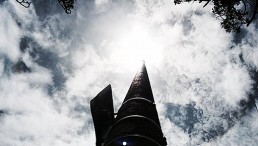A small brown rat which lived on a tiny island off northern Australia is the world's first mammal known to have become extinct due to "human-induced climate change," the Australian government says. The Bramble Cay Melomys inhabited a small coral island on the Great Barrier Reef, measuring about five hectares or 12 acres, and located in the Torres Strait, between Queensland state and Papua New Guinea.
The mammal had not been seen for almost 10 years and was originally declared extinct after "exhaustive" conservation efforts failed, according to a report published by the University of Queensland in 2016. That finding was confirmed by the Australian government on May 6 of this year. The cause of its extinction was "almost certainly ocean inundation" from rising sea levels over the past decade, which led to "dramatic habitat loss," according to the 2016 report.
"It's not a decision to take lightly," Geoff Richardson, assistant secretary for environment and energy, told members of the Senate, or upper house of parliament. "When something is listed as extinct it essentially ceases to get any protection."
Several hundred of the rodents were believed to occupy the island in the 1970s. But their population rapidly declined thereafter. By 1992, Melomys' population had dropped significantly and was declared endangered by the Queensland state government. Critics of Australia's conservation efforts say the cause of Melomys extinction was due to lack of resources for preserving wildlife.
"Bramble Cay Melomys' extinction is an absolute tragedy," said Greens party senator Janet Rice, who is chairing a Senate inquiry into the country's extinction crisis. "Labor and Liberal's addiction to coal is the death warrant for many of our other threatened animals," she said, referring to the mining policies of the major political parties.
In a 2015 Study by the University of Connecticut, it has been speculated if temperatures continue to rise, nearly 8% of all species worldwide could become extinct with Australia, New Zealand, and South America to be at the highest risk.



![Sat-Nav in Space: Best Route Between Two Worlds Calculated Using 'Knot Theory' [Study]](https://1721181113.rsc.cdn77.org/data/thumbs/full/53194/89/56/50/40/sat-nav-in-space-best-route-between-two-worlds-calculated-using-knot-theory-study.png)










